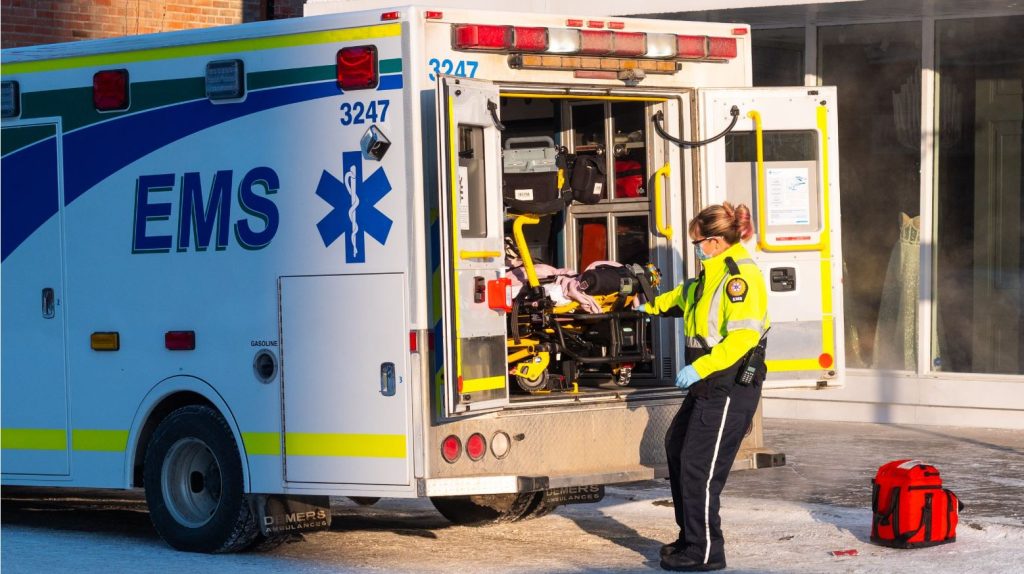EMS response time for Calgary women in fatal dog attack investigation concludes

The wait time for a woman that died from a fatal dog attack would have been 14 minutes had it been coded as “life-threatening,” according to an independent review conducted by the Health Quality Council of Alberta (HQCA) on Thursday.
The attack happened on June 5, 2022, in the Capitol Hill neighbourhood, where police and paramedics found 86-year-old Betty-Ann Williams suffering injuries after an attack by three dogs.
She was taken to hospital by ambulance after 30 minutes of waiting and later died.
Advertisement
In a news conference, CEO of the HQCA Charlene McBrien-Morrison said several challenges contributed to the fatality.
However, she says consolidation of Alberta’s emergency dispatch systems did not slow the response.
“The communication protocols were in place, they just weren’t used correctly. And the tools that were there were either misunderstood or misused,” McBrien-Morrison said.
“That’s why the recommendations regarding that piece are very clear on establishing how those phone lines, for example, should be used and in what circumstances they should be used.”
McBrien-Morrison says the challenges included it being initially coded as “non-life threatening.”
Advertisement
“There were challenges in providing updates on the patient’s condition. Demand for EMS exceeded the available resources that day. EMS initially went to … the patient’s front door of the patient’s home and not the back alley. And lastly, the relationship between Calgary 911 and Alberta Health Services EMS negatively affects how they work.”
Related Stories:
-
EMS response to deadly Calgary dog attack under investigation
-
Elderly woman dead after dog attack in northwest Calgary
-
Charges laid in fatal dog attack in Calgary
She also says there were no available ambulances in the Calgary Zone, there was a high number of high-priority EMS dispatch events at the time of the incident, paramedics were busy with patients at Calgary ER departments, and there was a shortage of staff in the EMS Southern Communications Centre that day.
As a result, the HQCA has made several recommendations like working with Calgary police and fire departments to develop an understanding or co-evaluation of 911 calls and a process for triaging low-acuity patients alternate clinical supports.
AHS says it’s already working on them, including working on a real-time tool to support the sharing of expected service time to people who call 911. It also says 20 more ambulances are going to be added to the streets in Edmonton and Calgary.
When asked if Williams would have survived had the response time been faster, Dr. Ian Walker, AHS medical director of EMS, says, “I don’t know.”
Advertisement
“What we do know about trauma is that earlier responses are better,” he said. “The sooner we get to trauma patients, the better they do, as a rule.”
“Even if the answer about Miss Williams specifically (surviving) is no, that it wouldn’t have made the difference, I still think there is much to be learned here. And if there are things that we can take from this report that allow us to provide better, faster, more responsive service, then we should do that. Right, even if it wasn’t going to save Mrs. Williams per se.”
The Calgary Police Service released its own review of Williams’s death and its emergency response.
In October, police said it will not press criminal charges against the dog owners. However, one of the dogs was surrendered to the city in July, where a judge ordered the dog to be euthanized.
Read More: Calgary police won’t lay charges in fatal dog attack
Meanwhile, the provincial NDP says the report showed that the understaffing issue with EMS led to the “badly delayed response” to the attack.
“For months, we have heard warnings about chronic understaffing of emergency services and the potentially dangerous outcomes of the chaos the UCP has created in our health care system. Today, we can see this has had deadly results, and it needs to be fixed immediately before more Albertans are put in danger,” said NDP Health Critic David Shepherd.
Advertisement
Shepard says the recommendations to reduce wait times are “too little too late” and doesn’t say anything to address understaffing by hiring more emergency workers.
“We are in a crisis, and as you see from this report, Albertans’ lives are at risk. Yet, the UCP keeps tinkering around the edges rather than addressing the real issues. They need to hire more people and retain those already working, or we could see more tragic stories like this.”
